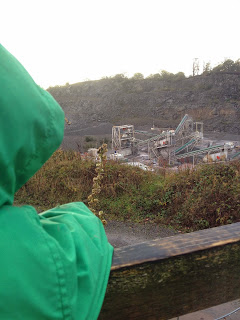When I think about who I want my children to be when they
grow up, I always come back to the same conclusions. I want them to be happy. I
want them to have a fulfilling life, a job that inspires them, and the ability
to hold down a loving relationship. I have no desire to tell them who they
should be, or push them to do things purely because it is the societal norm. My
dream is that they become the people they were created to be.
Both our boys are adopted, and have experienced things in
life that no human should ever experience. Our eldest, Michael (names changed
for privacy reasons) is five, and currently (well until today!) in year one at
school. Our youngest, Steven is nearly two and therefore not at formal
education age.
Michael struggles at school. He has attachment and emotional
problems due to the horrible early life trauma he experienced. He also has
partial foetal alcohol syndrome. Because of these things, he struggles
socially, has problems with gross and fine motor skills and has a very chaotic
brain that is easily overwhelmed. Despite all this, Michael is the brightest,
cutest, kindest, funniest five year old boy I know (OK so I might be slightly
biased!!), and I feel so very privileged to be his mother. His memory is
amazing, and his understanding and thirst for knowledge never ceases to astound
me. At the age of four, he was assessed as having a reading age of seven! He
loves to read and he loves to learn, but when it comes to “school” he is a
square peg in a round hole. The class environment overwhelms him. There is too
much distraction; classrooms are stressful places and visually too much for him.
The noise levels are (understandably) too high, and the politics of friendships
is confusing. However, I really want to stress that our decision to home
educate is in no way a reflection on his teachers, school or class. He has been
blessed with really amazing teachers. But they have thirty children to teach,
and a ridiculous curriculum to follow with ever changing pressures being put on
them. I admire teachers greatly; they work so very very hard!
For children that fit the school mould, school can be an
inspiring and encouraging place. However, for children like ours, it crushes
their desire for learning and tries to force them to fit into being something
(someone) that they’re not. Beatrix Potter said it beautifully herself, “Thank
goodness I was never sent to school; it would have rubbed off some of the
originality.”
So today, filled with fear and excitement, we have
deregistered Michael from school!
Initially we will begin with a month or two of de-schooling.
It’s an important part of the transition from school to home that we will all
need to experience together. Basically it’s “chilling out”. We will have lots
of fun and go places. The world will become our school! We’ll visit museums,
galleries, historic sites. We’ll attend concerts, plays and sporting events.
We’ll go to Home Ed groups and socialise with old and new friends. This
experience of autonomy will be a great way to help us all embrace the benefits
of homeschooling.
We have spoken and met with other home schooling families,
and the biggest bit of advice has always been the same: “Don’t try and imitate
school. Let their thirst for knowledge grow naturally and nurture their
inquisitiveness. They will acquire a love for learning.” Already at the age of
five, Michael comes home from school telling me that “writing is boring” which
fills me with sadness. Why on earth children of his age are expected to sit
still and write the amount they are I do not know! Apparently OFSTED are “hot
on handwriting” at the moment and therefore all schools are pushing their
students earlier than ever before. A lot of Europe doesn’t start formal school
until the age of seven, and personally I think they have it right. By home
educating, we don’t have to follow the national curriculum. We don’t have to
answer to OFSTED. We get to spend every day together, learning by seeing,
doing, and investigating; learning through life. Michael loves to find out how
things work. He’s always asking questions and wanting to do “experiments”; this
is when he truly engages. We will be able to work at a pace that suits him, not
one that fits with the average of a class. We will also be able to follow the
path where he takes us, and be led by his inquisitiveness.
My hope is that over all, life will become less hectic. He
will no longer be expected to learn in an environment that sends his brain into
chaos. During school holidays he becomes so much more relaxed and happy - it’s
delightful!! This past half term break is what has given us the final push to
get on and go for it. The pros well out weight the cons, and for us we hope it
will make our whole family life a happier place.
We are not necessarily seeing this as a one-way road. We are
well aware that it might not work, or that there may well come a time when it
no longer suits. But it’s something we know we will always regret if we don’t
try.
So this is the new adventure in our life, and we are so very excited!



























